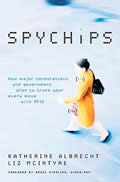Other
Starrett
Articles:
Seat Belts,
Cigarettes and
Stout
S.A.R.S. Simply Another
Ridiculous Scam
HOW MAJOR CORP'S. PARTNERING WITH GOV'T. PLAN TO TRACK YOUR EVERY MOVE
By Mary Starrett
November 5, 2005
NewsWithViews.com
When Harvard doctoral candidate and privacy advocate Katherine Albrecht started sniffing around the halls of MIT and got her mittens on some major corporation�s internal memos she discovered an Orwellian plan that she wasted no time trying to warn us about.
Big companies are spying on us.
The founder of C.A.S.P.I.A.N. (Consumers Against Privacy Invasion and Numbering) has compiled the disturbing evidence in a book. Within days of being published �Spychips� shot to the top of amazon.com�s non-fiction list. It�s no wonder; calling the book the �Devil�s Dictionary for RFID�, WIRED.COM�s Bruce Sterling said: �If you�ve never heard of RFID or �spychips� it would be quite a good idea to read this book pretty soon� Hurry. Waste not another precious moment.� Sterling calls Albrecht and her co-author Liz McIntyre �the Lone Ranger and Tonto of the RFID frontier� computerized super female consumer advocates of tomorrow�two loud, flamboyant, irrepressible Internet activists, researching and publishing the secretive, business-confidential� of how corporations and government are tracking our every move.
Bottom line is this: Tiny, traceable chips are in stuff we buy, right now. It�s a creepy concept and very 1984-ish, but it�s reality and we�d better get a bead on the current and planned-for applications of the simple, little technology with big privacy invasion potential. This book primes the pump for a huge consumer backlash, because leviathan corporations have gone to great lengths to make sure consumers don�t find out how extensively RFID technology is being (secretly) used and promoted. Big companies like Wal Mart, Proctor& Gamble, Exxon- Mobil, Benneton, Philips, Gillette, Max Factor�. to name a few, and, as you might expect the federal government are already using traceable chips all the better to spy on you with, my dear.
The book �Spychips� is well-documented, easy to read and immensely entertaining. The authors treat a serious subject with humor, and you don�t have to be a techie to get it (having just mastered �Cut� and �Paste� I am proof of that.) �Technology�is a queer thing. It brings you great gifts with one hand and stabs you in the back with the other�. -- C.P. Snow, New York Times, 1971
�Spychips� details a world of no more privacy �where your every purchase is monitored and recorded in a database and your every belonging is numbered.� The book outlines how RFID is being used in medications Viagra and Oxycontin and how the FDA is pushing for RFID on all prescriptions. [Spychips is a book that everyone should have. Order "SpyChips"]
Naming Names
�Spychips� is in essence saying �I�m telling� to major corporations like Proctor & Gamble and Gillette. P&G�s Lipfinity lipstick�s been tagged with live RFID chips (at one time the company even surreptitiously videotaped women as they picked out their favorite shade sending live pictures back to corporate voyeurs thousands of miles away.) Gillette placed an order for 500 million RFID tags and was busted after secretly placing the devices in Mach3 razors. Add these products to the list of RFID-tagged consumer goods like Pantene Shampoo, Purina Dog Chow and Huggies baby wipes.
In Spychips we learn the fascinating history of RFID. It had its origins, Albrecht and McIntyre tell us, with a Russian spy named Lev Termen. Termen (aka Theramin) used sold-out concerts in New York�s Metropolitan Opera House to actually relay intelligence information back to the Soviets. Based on that technology an RFID bug was later hidden in a wooden plaque of the Great Seal of the United States and presented to U.S.
Ambassador Averell Harriman by Russian school children in 1945. The spychipped plaque hung in the ambassador�s office giving up Cold War secrets until it was discovered in 1952. At the time, American spooks hadn�t a clue what this RFID technology was. Now, not only have they since figured it out, but government, along with global corporations is now using it to spy on the American people.
�Spychips� explains that, with funding from P&G, Gillette, and the Uniform Code Council (the bar code folks), the MIT Auto-ID Center became the proving ground for RFID and all its invasive applications back in 1999. In no time the Center�s goal was to see RFID tags on every manufactured item with a single, global network to track them. For instance, the nosey folks at IBM have been working on ways to track people in libraries and elevators. ( And you thought Muzak was ubiquitous!)
Function Creep
The technology that yesterday enabled manufacturers to keep track of pallets of shipped goods is already being proposed for decidedly more invasive applications. One patent application describes a �sniffer� or RFID reader which would be used on the doorway of homes and cars to inventory the consumer�s spychipped items and send the results to marketers. The book points out that as with everything related to RFID, the motive is to spy on us for marketing purposes.
The potential for the government�s abuse of this technology is discussed as well. Albrecht and McIntyre write that �far from protecting the public from the RFID threat, our government is actively promoting the technology� the department of Defense and the United States Postal Service�� were sponsoring members of the Frankenstein laboratory �like Auto ID Center. The U.S. Department of Agriculture and the Food and Drug Administration �are both encouraging RFID adoption through their recently issued �track and trace� guidelines�.
RFID chips in �smart guns�, schoolchildren being �tagged� for �security�the list is getting longer all the time.
Can You Say: �Schnuffelchippen�?
That�s the German word for �spychips� or RFID tracking devices. Germans were up in arms when they recently found out the �loyalty� cards they carried for the Metro Future Store contained spychips. The grocery store was forced to recall more than ten thousand cards it had issued to unwitting shoppers and that was just the beginning.
Massive protests, testimony before government committees and media interviews decrying the deception followed. Consumer backlash can be ugly. German consumers did not take kindly to being tracked.
�Spychips� reminds us �(i)n the dark days of Germany�s Third Reich, Jewish people had become the hunted. The only way they could escape deportation to Nazi death camps was by fleeing the country, hiding or blending in�� In other words, those who survived had discarded their yellow stars of David marking them as Jude, the symbol that made it easy to spot them and keep track of them. No doubt if the Nazis had had RFID their �final solution� would have made any escapes impossible.
|
Subscribe to the NewsWithViews Daily News Alerts! |
Katherine Albrecht and Liz McIntyre have managed to ferret out the dirty, little secret that�s so far managed to remain hidden.
That is until now.
� 2005 Mary Starrett - All Rights Reserved
Sign Up For Free E-Mail Alerts
E-Mails
are used strictly for NWVs alerts, not for sale
Mary Starrett was on television for 21 years as a news anchor, morning talk show host and medical reporter. For the last 5 years she hosted a radio program. Mary is a frequent guest on radio talk shows.
Web-Site: www.oregoniansforlife.org
E-Mail M123STAR@aol.com�
�Spychips� details a world of no more privacy �where your every purchase is monitored and recorded in a database and your every belonging is numbered.�









